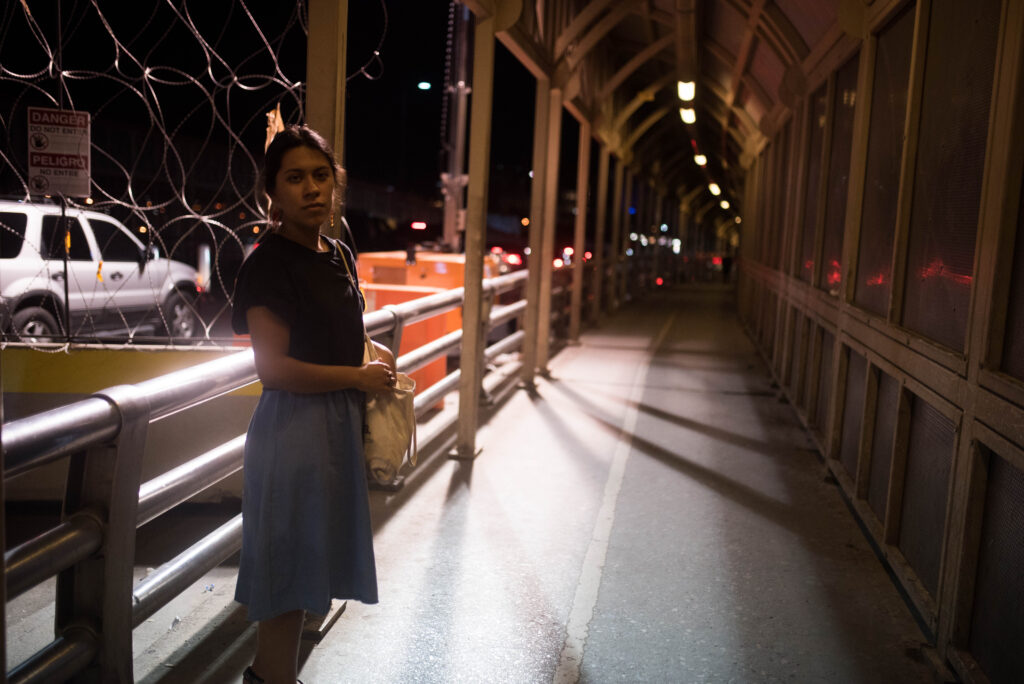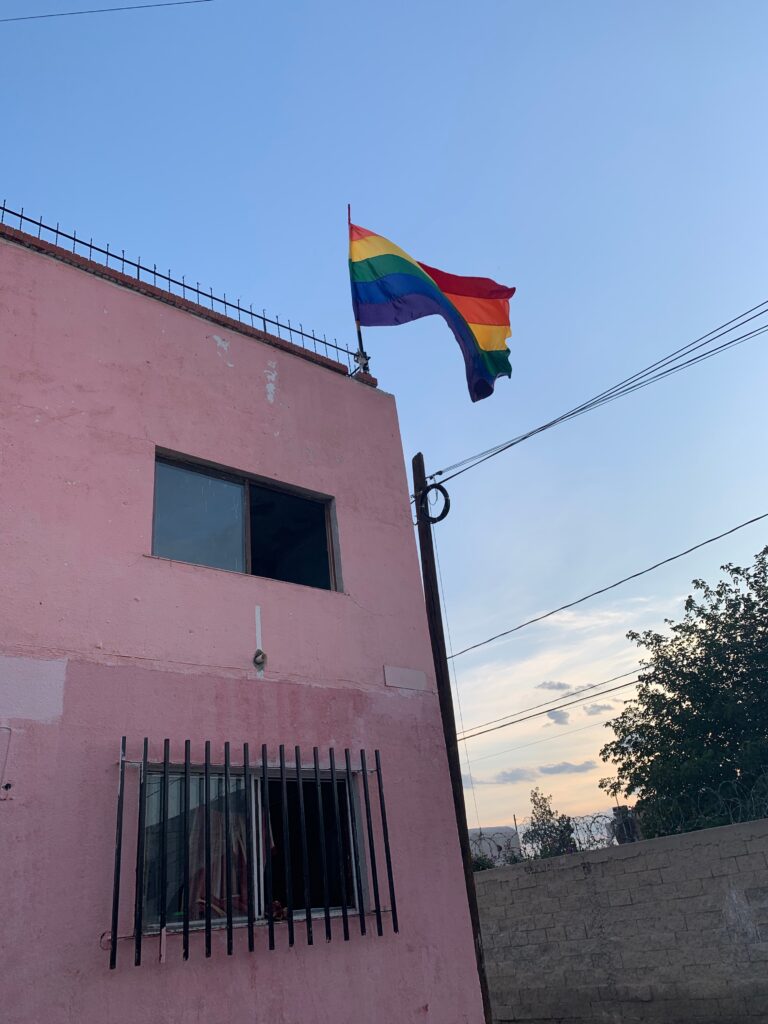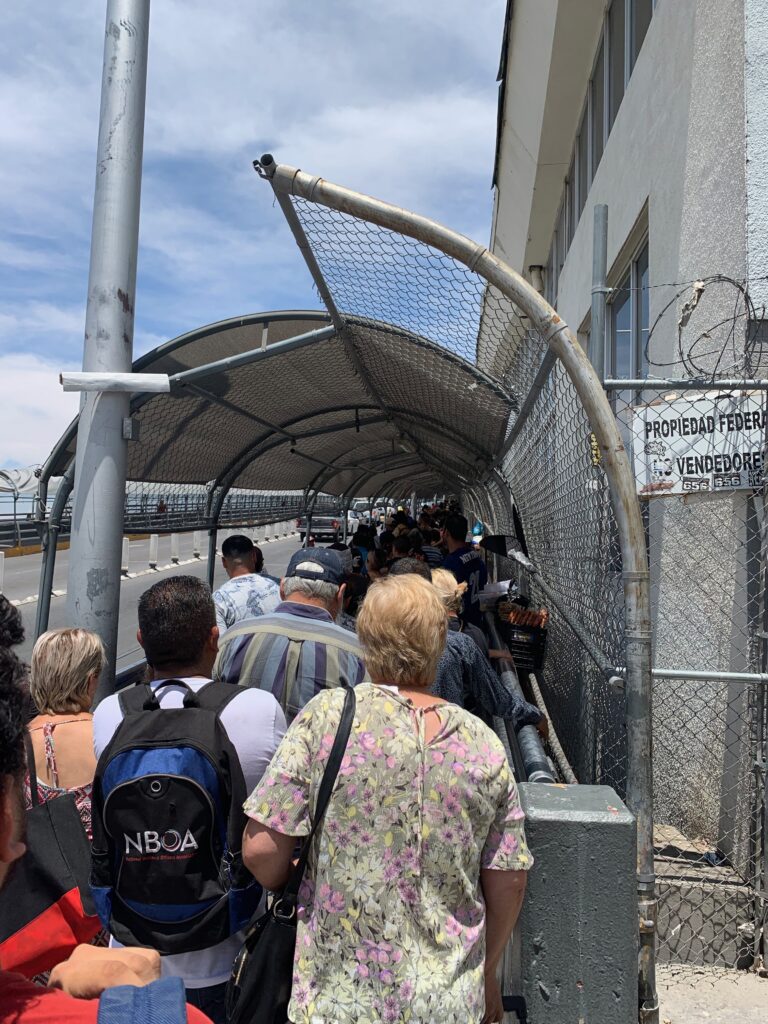LGBTQ+ Migrants: Strategizing Love and Survival at the U.S.- México Border
by Polet Campos-Melchor

During summer 2019, I conducted ethnographic research with Indigenous and Afro-Indigenous Lesbian, Gay, Bisexual, and Transgender (LGBT+) migrants in Ciudad Juárez, México. As part of my research, I asked my interlocutors questions about their experiences and motivations. I documented their migration process, observing both the uncertainty and the constant threat of violence that LGBTQ+ migrants face daily. I also took note of the survival strategies that they were using and how they understood survival. Each one of my interlocutors said love motivated them to continue their journey to the United States despite its many risks.
Throughout my fieldwork, I crossed the U.S./ México border daily. For eight weeks, I worked with LGBTQ+ migrants in an LGBTQ+ centered shelter in Juárez. About a week into my fieldwork in Ciudad Juárez, I met Esperanza, the Rarámuri, and Mennonite “mother” of the Pink House. As I walked through the streets of Calle Hospital, I saw a bright pink house with a rainbow and a trans flag hanging from the roof. Esperanza, a tall, pale woman with nineties-styled rolled bangs and warm brown eyes greeted me. She, along with recently arrived migrants, runs the house as a safe space; on many nights, residents dress and perform pasarelas (fashion shows) freely. Before meeting in person, we had spoken on the phone twice. The process of making this contact was circuitous. I was introduced to Esperanza via a contact from Las Cruces, New Mexico – an on-the-ground volunteer who received my information from a member of the El Paso LGBTQ+ center where I was volunteering. Esperanza is a well-known member of the LGBTQ+ community, and her goal is to keep LGBTQ+ migrants off the streets and get them into homes where they feel safe and welcome.

During our initial interview, Esperanza told me that all her local friends in the LGBTQ+ community had passed away. She is motivated by the loss of her friends from the AIDS epidemic and has committed herself to serve and protect her community. But, she mentioned, ongoing transfemicides are difficult to tolerate. “Migration is a situation of life and death [for us],” she said.[1] Each time a trans woman is killed in Ciudad Juárez, the authorities call her to see if she can identify them. Love, as articulated by bell hooks, emerges as a tool for establishing kinship, relationships of mutual trust, survival, and obligation.[2]
Esperanza created the shelter as a form of caring and providing security for trans women. Today, the Pink House is the only shelter in Ciudad Juárez created by and for the LGBTQ+ migrant community. Esperanza not only provides a home for the community, but is also a witness in accounting for transfemicides in Ciudad Juárez as well as accounting for the whereabouts of the trans women who pass through the Pink House and into detention centers. Esperanza’s testimonies provide witness accounts of the ongoing injustices committed against trans women; she shows up for the dead regardless of her relationship to them.
My research takes place amidst ongoing racial, political, and humanitarian crises at the U.S.-México border. The support from my advisor Dr. Ana-Maurine Lara, the Tinker Foundation, and CLLAS has allowed me to conduct research that maps LGBTQ+ migrants’ experiences and works towards how they articulate survival strategies and love, expanding beyond only the imaginary into tangible strategies of survival. Through community organizing, LGBTQ+ migrants are bringing visibility to the LGBTQ+ community in Ciudad Juárez.

References
[1] Esperanza. “Esperanza Parte II.” Interview by Polet Campos-Melchor. September 4, 2019.
[2] bell hooks. All about Love: New Visions. 1st ed. New York: William Morrow, 2000. Print.
About the author
Polet Campos-Melchor is a second-year graduate student in the Anthropology Department whose research focuses on the U.S./ México borderlands with interests in love, the continuities of colonization, Black, Xicana, and Native feminisms. Her Master’s research explores how LGBT+ migrants in Ciudad Juárez articulate survival strategies and love. Her PhD research analyzes how love can be re-conceptualized as a survival strategy in the context of migration.
CLLAS News & Updates
Maria Fernanda Escallón, Assistant Professor of Anthropology, was recently awarded an NEH Fellowship to fund completion of her book, tentatively titled Excluded: Black Cultural Heritage and the Politics of Diversity in Colombia. Fernanda Escallón also recently published an article on “Rights, Inequality, and Afro-Descendant Heritage in Brazil” in the journal Cultural Anthropology. Additionally, her article “Negotiating intangibles: the power, place, and prestige of NGOs in heritage governance,” was published in the International Journal of Heritage Studies in December 2019.
Carlos Aguirre, Professor of History, co-authored an article that was published in late 2019 in the journal Revista de la Biblioteca Nacional de Uruguay. The article was co-authored with Augusto Wong Campos, and is titled, “Mario Benedetti y el internacionalismo literario: Casa de las Américas, el Centro de Investigaciones Literarias y la serie Valoración Múltiple (1967-1976).” Additionally, Aguirre received the 2020 Presidential Fellowship in Humanistic Studies from the UO to fund his research for the upcoming academic year, on “The Inner History of the Latin American Literary Boom.”
Audrey Lucero, Associate Professor & Doctoral Program Director of Language and Literacy Education, has received a Faculty Research Award from the UO Office of the Vice President for Research & Innovation. The grant will fund a project titled “Crossing Borders: Perspectives of Transnational Students in Oregon High Schools,” wherein doctoral student Bobbie Bermúdez Bonilla and I will distribute a survey to approximately 300 Oregon high school students from immigrant families, and conduct focus groups in four parts of the state to better understand how high schoolers who identify as immigrant or transnational young people construct their identities, and how these identities influence their social and educational high school experiences.
